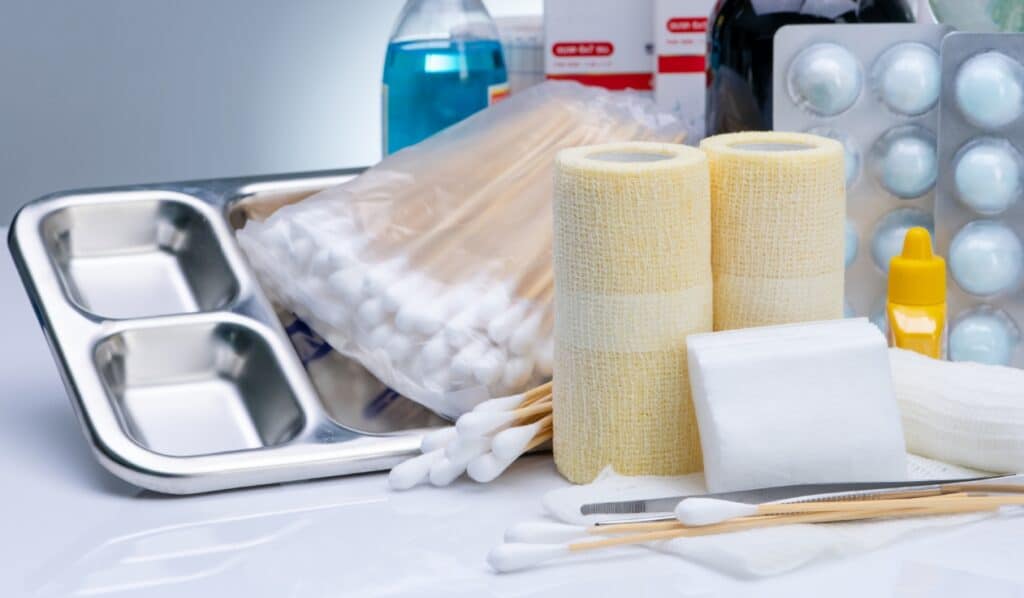21 Essential Nursing Skills You Need To Know
Nursing is an incredibly rewarding career, but it requires a range of essential nursing skills to be successful. In addition to the nursing tools and gear you must have, skills you learn in nursing school, on the job training and experience are essential to mastering the role.
From hard skills like obtaining vital signs and charting to soft skills like communication and time management skills, nurses must be prepared to tackle an array of tasks. In this blog post, we’ll review some of the essential nursing skills that you should have in order to be successful.

Essential nursing skills: Overview
Essential nursing skills are the fundamental abilities that a nurse must possess in order to be successful. These skills allow you to provide quality patient care, work collaboratively with other healthcare professionals, and manage time and resources efficiently. You can think of essential nursing skills as a “toolkit” of necessary abilities for the job. Some of the most important nursing skills include both technical and soft skills.
Technical nursing skills involve the use of medical equipment and performing patient assessments such as taking vital signs, administering injections, starting IVs, and even basic life support. Soft skills include communication skills, creative problem solving, time management, critical thinking, conflict resolution, and empathy. These skills are used to create positive relationships with patients and their families.
Essential soft skills for nurses
Being a nurse is more than just performing clinical tasks and following medical protocols. It also requires a set of soft skills that are critical to providing quality patient care and being an effective member of a healthcare team. As a nursing professional, you know that these skills are not always taught in nursing school, but rather acquired through experience and personal growth. Here’s an overview of some essential soft skills nurses should possess:
1. Communication

Effective communication is key to building rapport with patients, their families, and your colleagues. As a nurse, you must be able to use your verbal and written communication skills to convey your thoughts clearly and in a way that is easily understood by others. Listening is also an important aspect of good communication – take the time to hear your patients’ concerns and questions. Practice active listening by repeating what they’ve said in your own words to ensure that you’ve understood them correctly.
2. Critical Thinking
In the fast-paced, ever-changing world of healthcare, nurses must be able to think on their feet. Critical thinking involves analyzing information, identifying problems, and developing solutions. To hone your critical thinking skills, ask questions, challenge assumptions, and gather as much information as possible before making a decision. Remember that critical thinking is an ongoing process, and there is always room for improvement.
3. Time Management
Time management is essential for managing patient care, documentation, and other tasks required of a nurse. Start by prioritizing your tasks based on urgency and importance and then create a schedule that works for you. Avoid multitasking as it can be inefficient and lead to mistakes. Take regular breaks to avoid burnout and stay productive throughout your shift.
4. Empathy
Nursing is a profession that requires empathy and compassion. Empathy involves understanding and connecting with your patients on an emotional level. To cultivate empathy, take the time to listen to your patients’ stories and acknowledge their fears and concerns. Put yourself in their shoes and provide emotional support while seeking out practical solutions.
5. Attention to Detail

As a nurse, you must be thorough and detail-oriented to ensure that patients receive the best care possible. Attention to detail involves being observant and noticing changes in a patient’s condition or behavior. Develop a system for documentation to ensure that you don’t miss any critical information. Keep up to date with the latest medical information and procedures to provide the highest level of health care.
6. Interpersonal Skills
Nursing is a team-based profession that requires effective teamwork and collaboration. Good interpersonal skills are needed to communicate effectively, for conflict resolution, and building positive relationships with patients, colleagues, and other healthcare workers. Practice active listening, respect differences, and provide constructive feedback to build strong, interprofessional relationships.
7. Leadership
Leadership is an essential skill for nurses who are responsible for managing patient care and leading healthcare teams. Leaders inspire and motivate their teams to achieve common goals. To develop your leadership skills, take on leadership roles, volunteer for committees, and seek out professional development opportunities.
8. Flexibility
Nurses must be adaptable and flexible to navigate the fast-paced, unpredictable healthcare environment. Flexibility involves being able to adjust to changing circumstances and shifting priorities. To practice flexibility, be open to new experiences, take on new responsibilities, and embrace uncertainty with a positive attitude.
9. Cultural Awareness

As nurses, you must be aware of the diverse cultures and backgrounds of your patients and colleagues. Cultural awareness involves being sensitive to different beliefs, values, and customs while understanding how they impact patient care. Take cultural competency courses and seek out opportunities to learn about different cultures to provide culturally sensitive care.
10. Professionalism
Nursing is a professional career that demands a high level of professionalism. Professionalism involves exhibiting competence, respect, and integrity in your work. Practice punctuality, dress professionally, and abide by the code of ethics. Be accountable for your actions, and avoid engaging in gossip or other unprofessional behavior.
11. Conflict Resolution
Conflict is inevitable in any workplace, especially in healthcare. Nurses must be able to resolve conflicts effectively to maintain a positive work environment and prevent patient care from being compromised. Practice active listening, remain calm and objective, and seek to find common ground when resolving conflicts.
Soft skills are essential for nurses to succeed in their careers and provide excellent patient care. By honing these skills and continually seeking out opportunities for growth, you can build a successful and fulfilling nursing career that positively impacts many lives.
Essential technical skills for nurses
As an aspiring or new nurse, you’re likely eager to learn as much as possible about your chosen nursing profession. While having a compassionate nature and a willingness to help others are important skills for any nurse, there are also a number of specific technical skills that are essential for success in this field. Below are some top nursing skills that you’ll want to have in your arsenal:
12. Assessment
As a nurse, you’ll need to be able to effectively and accurately assess your patients. This includes taking vital signs, conducting physical exams, and gathering information about the patient’s medical history. To be proficient in assessing your patients, you’ll need to have an eye for detail and excellent observational skills. One tip is to practice assessing multiple patients with a mentor or other nurses and seek feedback.
13. History Taking

Another essential skill for nurses is the ability to take comprehensive medical histories. This involves asking questions about the patient’s medical background, family history, and any symptoms they are experiencing. You’ll want to develop a systematic approach to history taking to ensure that important information isn’t missed.
14. Medication Management
Nurses are often responsible for administering medications to patients through a variety of routes, including oral, intravenous, and topical. It’s important to have knowledge on medication management, including dosage calculation, medication interactions and contraindications, side effects and adverse reactions. Attention to detail is key in medication administration to avoid medication errors.
15. Basic Care Techniques and Knowledge
Basic care techniques include maintaining hygiene, monitoring vital signs, turning and repositioning patients, and assisting with activities of daily living. It’s important to perform these techniques regularly and consistently to prevent complications such as pressure ulcers, deep vein thrombosis, and pneumonia.
16. Advanced Procedural Techniques
In some cases you may work in specialized areas requiring advanced procedural techniques such as blood draws, IV insertion, catheterization, and other invasive procedures. It’s vital to receive adequate training and practice before performing these procedures to avoid complications and improve patient outcomes.
17. Wound Care

Nurses also need to be knowledgeable in wound care and management, including how to correctly identify different types of wounds, selecting appropriate dressing, and prevention of infections. Collaborating with a multidisciplinary team to create a comprehensive care plan is necessary for optimal wound healing.
18. Urgent Care and Emergency Care
You should also be equipped to manage urgent and emergency situations, including cardiopulmonary resuscitation (CPR) and advanced cardiac life support (ACLS). Attend regular training sessions and maintain certification to ensure your preparedness for emergency situations.
19. Teaching
As a nurse, you’ll be responsible for educating your patients and family members on their health conditions, medications, and treatment plans. Tailor your teaching approach to your patient’s level of understanding and provide opportunities for questions and clarification.
20. Patient Safety
When it comes to patient safety, nurses should always prioritize the wellbeing of their patients. This includes following proper patient transferring procedures to prevent falls and other injuries, and strict adherence to infection control protocols to minimize the risk of hospital-acquired infections.
21. Technology Skills

Nurses need to be able to use various documentation technologies such as electronic health records, barcoding systems, and medication dispensing systems. It’s important to stay up-to-date with new technology advancements to improve patient care.
You’ll need to master various technical skills to become an effective and competent practitioner. The key to mastering these skills lies in practice, continuous learning, and collaboration with colleagues, mentors and other healthcare professionals. Developing these essential skills also takes time and dedication, but the reward is in giving high-quality care that will make a positive impact on the lives of patients.
Tips on developing your nursing skills
Whether you’re just entering the nursing field or have years of experience, there are always opportunities to improve your skills and become a better nurse. Here are some tips for developing your nursing skills:
Focus on Your Areas of Interest
Focus on building up the areas of nursing that interest you most. For instance, if you’re passionate about pediatric care or geriatric care, you can focus on developing your skills in these areas. Invest time into reading up on the latest developments and attending conferences related to these specialties.
Join Professional Organizations
Joining professional organizations such as the American Nurses Association (ANA) and the National League for Nursing (NLN) can give you access to resources, like continuing education courses and networking opportunities. You can also take advantage of certification programs to expand your knowledge base.
Take Advantage of Technology
Use online resources such as webinars, podcasts, and tutorials to stay up-to-date on the latest treatments and technologies in healthcare. Having technology skills is becoming increasingly important for nurses as almost all hospitals have transitioned to electronic health records.
Seek Mentorship

Having a mentor is incredibly valuable for nurses, especially in the early stages of their careers. A mentor can provide you with feedback, advice, and support as you hone your nursing skills. Additionally, seek out opportunities to shadow experienced nurses to gain more insight into patient care.
Put Your Knowledge Into Practice
The best way to develop your nursing skills is through practice. Take the time to apply what you’ve learned and observe how it affects patient outcomes. Reflection on your practice can help you identify strengths and areas for improvement so that you can continually enhance your skillset.
Nursing skills list for a resume
When creating your nursing resume, it’s important to make sure you include the right skills. Here’s a list of some key skills you can include on your resume:
- Administering and monitoring moderate sedation
- Assessing cardiac and pulmonary sounds
- Care of drains/tubes
- Chest tube management
- Collaboration and Teamwork
- Critical decision-making
- Fall risk assessment/prevention
- IV Therapy
- Nebulizer treatments
- Obtaining cultures for septic workup (e.g. blood, sputum, catheter tips)
- Patient rights
- Performing complex dressing changes
- Restraints/use of least restrictive device
- Seizure precautions
- Specimen collection
- Administering and monitoring IV anticoagulants
- General medicine/surgery expertise
- Monitoring and assessing I&O (Intake and Output)
- Using PCA System (Patient-Controlled Analgesia)
- Using PICC, Hickman, Central Line
- Using SCD or venodyne devices
- Acute and rehabilitative care
- Admitting and discharging patients
- Care plan development
- Collaboration with healthcare team
- Effective communication with patients and colleagues
- Patient/family education
Your resume should demonstrate your breadth and depth of knowledge in nursing, so it’s important to carefully select the skills you include to ensure they accurately reflect your abilities. Use this list to get you started. Showcase your nursing education, experience, and expertise with these skills on your resume to stand out from other candidates.

Wrapping up
Nursing is a rewarding career that requires both soft and technical skills. In addition, investing in continuous learning and professional development can help you to become highly-skilled nursing students, licensed practical nurses, registered nurses, and nurse practitioners. You will be capable of delivering safe, effective patient care. Remember that developing your nursing skills takes time and patience. Stay motivated by setting goals for yourself and celebrating small successes along the way. You’ll be well on your way to becoming an exceptional nurse in no time!







